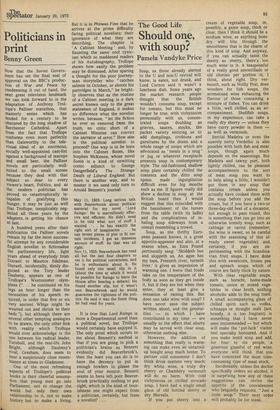Politicians in print
Benny Green
Now that the Soviet Government has set the final seal of approval on the BBC's production of War and Peace by condemning it out of hand, the next great television landmark we can look forward to is the adaptation of . Anthony Trollope's Palliser marathon, that Masterly series which has tended for a century to be Obscured by the long shadow of Barchester Cathedral. Apart from the fact that Trollope Conforms even more perfectly than Galsworthy to the televisual ideal of an enormous, socially well-appointed cast-list against a background of teacups and small beer, the Palliser novels are particularly wellsuited to the small screen because they deal with that subject so dear to every viewer's heart, Politics, and as the modern politician has Proved, so catastrophically incapable of gratifying this hunger, it may be just as well that Trollope, inexplicably neglected all these years by the adapters, is getting his chance at last.
A hundred years after their Publication the Palliser novels remain by far the most success ful attempt by any considerable English novelist to fictionalise the parliamentary life, light Years ahead of everybody from Disraeli to Maurice Edelman.
Disraeli, incidentally, thinly dis guised as the Tory leader Daubeny, appears as one of Trollope's Westminster olym pians (". . . he continued on his legs an hour longer than the necessities of his speech re quired, •in order that five or six very ancient Whigs might be wearied out and shrink to their beds "), but although there are several other tempting analogies to be drawn, the only other link With reality which Trollope would ever acknowledge is the one between his radical leader, Turnbull, and the real-life John Bright, although Daubeny's rival, Gresham, does seem to bear a suspiciously close resemblance at times to Gladstone.
One of the most refreshing aspects of Trollope's political books is their cheerful assumption that young men go into Parliament, not to change the world but only their own relationship to it, not to make history but to make a living. But it is in Phineas Finn that he arrives at the prime difficulty facing political novelists: their ignorance of what they are describing. The chapter is 'A Cabinet Meeting' and, by flaunting the same cool cynicism which so maddened readers of his Autobiography, Trollope shows how easily the problem may be dismissed. After sparing a thought for the poor journeyman storyteller who "catches salmon in October, or shoots his partridges in March," he brightly observes that as the routine of a Cabinet meeting is a dark secret known only to the great statesmen of England, it makes no difference what the novelist writes. because, "let the fiction be ever so removed from the truth, no critic short of a Cabinet Minister can convict the narrator of error." How else is the political novelist to proceed? One way is to be born into the Cabinet Room, like Stephen McKenna, whose novel Sonia is, a kind of unwitting comic adjunct to George Dangerfield's The Strange Death of Liberal England. But there is another way, and to master it we need only turn to Arnold Bennett's journal: May 11, 1925: Long serious talk with Beaverbrook about political material for my novel 'Lord Raingo.' He is marvellously effective and efficient. He didn't need to be told what sort of stuff I
wanted . . he has exactly the right sort of imagination . . . he can invent pieces of plot to fit certain incidents. I got an immense amount of stuff. So that was all right.
Nov 11, 1925: Beaverbrook has read all but the last four chapters to vet it for political correctness, and he is enthusiastic about it. He found only one small slip in it (about the time at which it would be possible for Raingo to leave the House after hearing a debate). He found another slip, but it wasn't one. Beaverbrook said he would guarantee the rightness of the politics. He said it was the finest thing he had read for years.
It is true that Lord Raingo is more a Departmental novel than a political novel, but Trollope would certainly have enjoyed it. The only point which occurs to me about Bennett's method is that if you are going to pick a politician's brains as Bennett evidently did Beaverbrook's, then the least you can do is to have the decency to put in enough howlers to please the soul of your mentor. Bennett seems to have left poor Beaver brook practically nothing to put right, which is the kind of boor ishness one might expect from a politician, certainly, but from a novelist? . . .


































 Previous page
Previous page